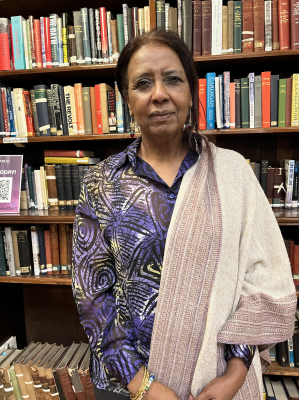"We feel abandoned" - testimony from Sudan

Hala Al-Karib
When human rights activist Hala Al-Karib testified to the All-Party Parliamentary Group on Sudan, she described the systematic rape of girls as young as seven years old and women in their eighties. As the war in Sudan enters its third year, Al-Karib was in the UK representing SIHA, (the Strategic Initiative for Women in the Horn of Africa).
"Women are the centre of this war, and mass sexual violence is used as a weapon of war," according to Al-Karib, who has spoken at several meetings in London organised by the NGOs Waging Peace, Governance Programming Overseas and Global Rights Compliance. The emphasis on gang rape illustrates the systematic nature of the assaults which are believed to number the hundreds of thousands.
"The more we took testimony from survivors, we realised that this is huge and it happens each day to girls and women. Of the rape cases documented by SIHA, 90% were committed by the Rapid Support Forces (RSF)."
Al-Karib said that in a conservative traditional society such as Sudan, it is stigmatising to admit that one has endured sexual violence. She told audiences of MPs and activists that the lack of acknowledgement of the scale of suffering in Sudan is painful to survivors. As the Sudanese Armed Forces (SAF) capture the capital, Khartoum, from the RSF, there is enormous need for medical support for victims of rape. However, both sides in the conflict have deliberately prevented adequate aid reaching civilians, using starvation as a weapon of war.
Al-Karib's group has documented the abduction of women who have been seen shackled in pickup trucks and driven off to sexual slavery hubs for distribution to RSF commanders. The enslavement of women is a profit centre for soldiers. While men who are kidnapped are ransomed, families will not admit their girls and women have been taken because it would imply that they will have been subject to rape. Female doctors and nurses in hospitals have also been targeted for sexual violence.
As the SAF retake areas formerly in RSF hands, they accuse volunteers running emergency response rooms and soup kitchens of collaborating with the RSF. However, Al-Karib explained, while the RSF were occupying towns, civil society had no choice but to communicate with the militiamen to navigate daily life and to support local people with food and medical help.
Women breadwinners have also suffered during the two years of conflict: soldiers are alleged to have looted money and livestock as they go door to door. Women are largely excluded from banking in Sudan, and are therefore vulnerable to having their savings stolen by marauding soldiers and militiamen who invade their homes.
Human rights groups believe 150,000 people have been killed in the conflict between the two generals who previously worked together to overthrow the transitional civilian government in 2021. The violence has displaced 12 million people, three million of them in neighbouring nations, and famine grips large parts of the country. The Sudanese Group for Defending Rights and Freedoms believes that an additional 50,000 people have disappeared in the conflict. When the SAF captured Khartoum, they found 4,000 civilians were being held by RSF-run detention camps. The Red Cross says 70% to 80% of hospitals are non-operational and subject to drone attacks.
On April 15th, the UK government will host an international meeting to discuss securing unfettered access for humanitarian aid. Al-Karib told a meeting of NGOs and ambassadors, "It is important to emphasize that aid and efforts to protect civilians should not be contingent upon ceasefire agreements. Furthermore, while Sudan faces the largest humanitarian crisis in the world, with famine declared in many areas, it remains the least funded crisis, receiving less than 5% of the support needed for its people."


















